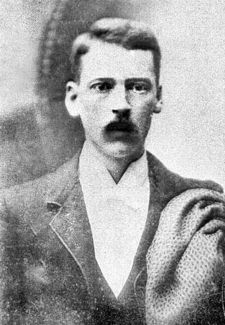Frasier Franklin Bingham (1872-1953) was a lumber magnate and shipbuilder.
| Frasier Franklin Bingham | |
|---|---|
| Born | March 25, 1872 Yankee Springs, Michigan |
| Died | 1953 |
| Occupation | Lumber magnate, shipbuilder |
| Religion | Presbyterian |
| Spouse | Fannie Augusta Oerting |
| Parents | Amos Reed and Caroline Merry Bingham |
| Children | Seven |
Contents
Early lifeEdit
Bingham was born in 1872 to Amos and Caroline Bingham in Yankee Springs, Michigan. He was educated in the public school systems of Chicago and St. Louis, and in his youth worked odd jobs. Among his employers were a printing office, a wholesale grocery, a rubber factory, a wool warehouse, a hay press factory, a metal and mineral brokerage, and a railroad refrigerator car service. Bingham took night classes at a business college and became trained in stenography.
In PensacolaEdit
In 1890, at the age of eighteen, Bingham moved to Pensacola from Kansas City, Missouri. He obtained a job as a clerk and stenographer for the Southern States Lumber Company. In 1900 he became a director, helping to manage the company's 400,000-acre holdings; shortly thereafter he was made assistant general manager of the company. He stayed with Southern States until it ceased operation in 1930.
In the late 1890s, Bingham and his father Amos Reed Bingham started the A. R. Bingham and Son Shipping Company, initially running consignment goods. The company soon began shipping lumber, using Bingham's connections in the industry to garner clients.
One of their earliest ships, the Richard A. Bingham (named for the younger Bingham's second child, born in 1902), had a disastrous pair of outings in 1903. In the former, Captain Raymond Leslie Merritt set two crew members adrift at sea in a yawl after suspecting a mutiny; the two men made landfall at Cozumel two weeks later and returned to Pensacola, accusing Merritt of going "insane" from lack of rum. In the latter excursion, the ship's new, inexperienced captain encountered a fierce storm and afterwards put in at Frontera, Mexico (which he had mistaken for Belize City, some 700 miles away). The port was too shallow for the weighted ship, so a third of its cargo was removed and steep fees were imposed. Bingham was summoned to settle the matter, and several weeks later he settled the matter at great expense and joined the crew for the remaining trip to Belize. He oversaw the loading of mahogany logs onto the ship and afterwards took a separate boat back to New Orleans, but the Richard struck a reef a day after its departure and was wrecked. The crew survived, but the total loss to Bingham was about $7,000, or more than 80 percent of his business assets at the time.
During World War I, Bingham opened a shipyard that built wooden schooners. The shipyard turned out over $200,000 worth of vessels, including several sold to the French government.
Political activitiesEdit
Bingham, a Republican, served for several years as the chair of the Escambia County Republican Executive Committee. He ran three times for public office: in 1907 he ran for the Pensacola Board of Public Works; in 1908 he ran for state legislature; and in 1929 he ran for the Pensacola Board of City Commissioners. However, Pensacola was a fiercly Democratic city and the Republican Bingham lost each of the races.
Personal lifeEdit
Bingham married Fannie Augusta Oerting (daughter of Charles McKenzie Oerting) on June 10, 1896, in Pensacola; the couple had seven children.
Bingham died in 1953 at his home on Bayou Texar, near the junction of East Gadsden Street and 20th Avenue. He is buried in St. John's Cemetery.
Other imagesEdit
ReferencesEdit
- St. John's Cemetery Foundation
- Armstrong, Henry Clay. History of Escambia County. St. Augustine: 1930. p. 350-353
- Jan Richard Heier. "The Short Life of the Richard A. Bingham: A Pensacola Lumber Schooner." Florida Historical Quarterly, Fall 2000.
